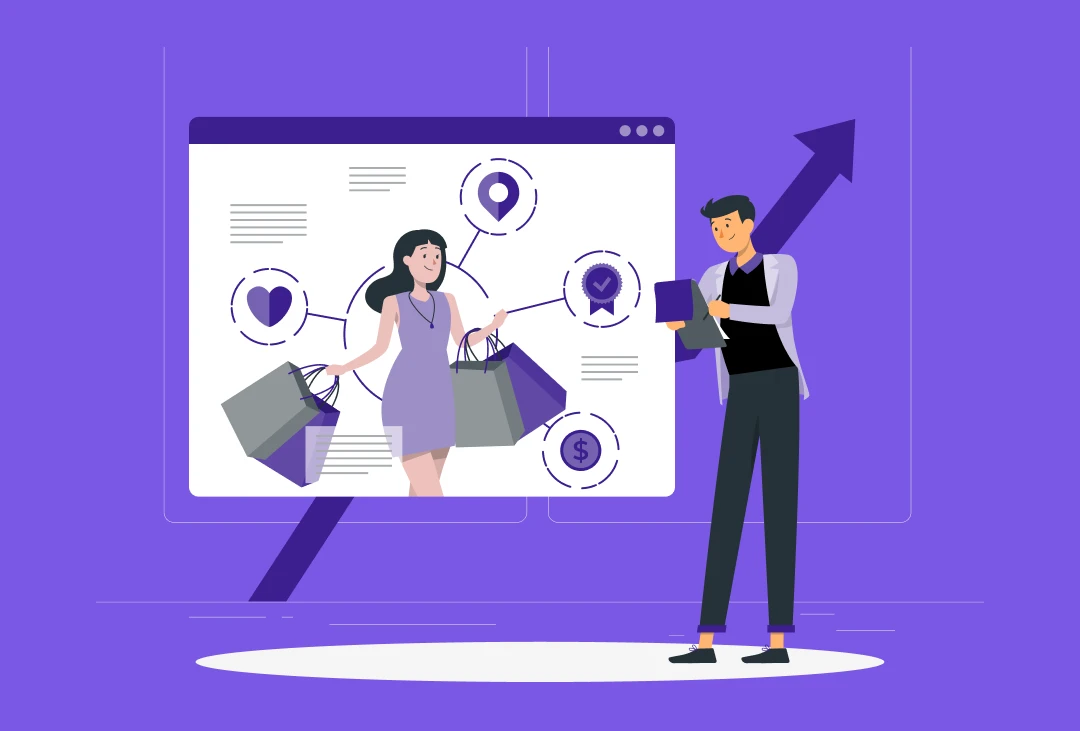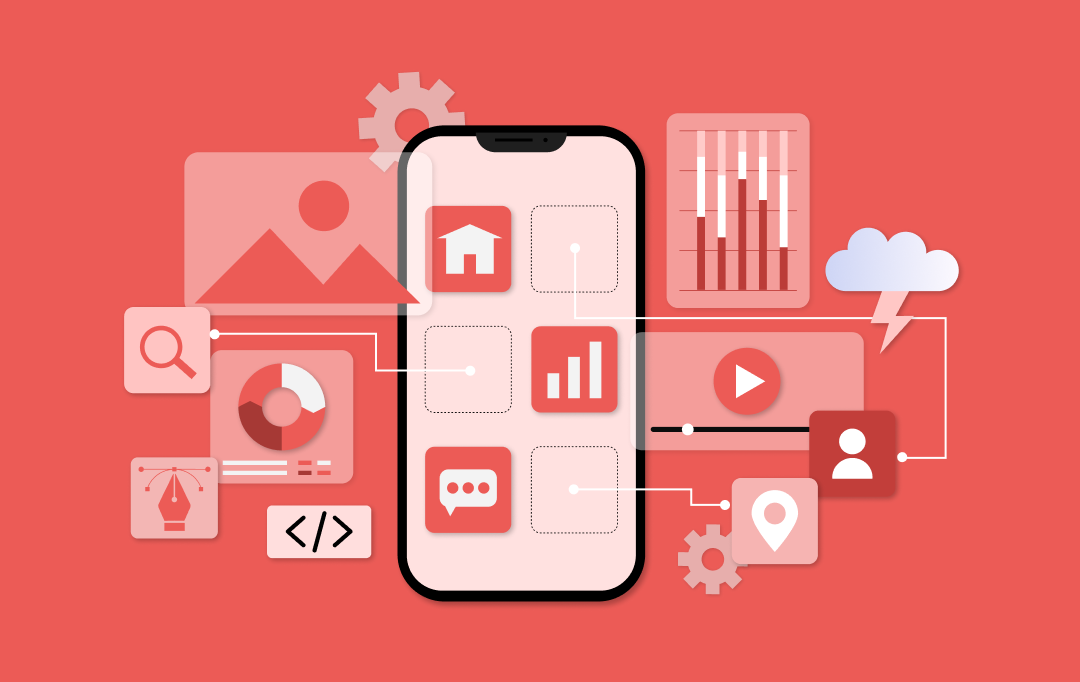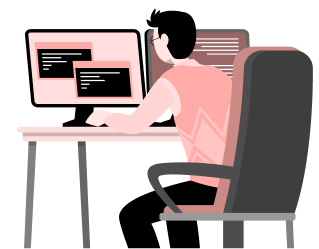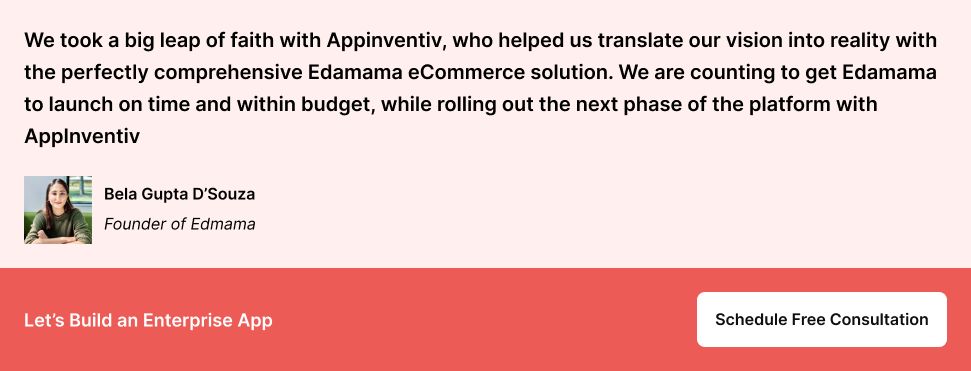- Understanding Dubai's 2040 Vision: Pillars of Progress
- Key Strategic Areas
- Sustainable Urban Development
- Enhanced Quality of Life
- Economic Growth and Diversification
- World-Class Infrastructure & Connectivity
- Preservation of Cultural and Urban Heritage
- How Custom Enterprise Apps Are Driving Dubai's Vision 2040
- Smart City Infrastructure
- Sustainable Development
- Inclusive and Vibrant Communities
- Data-Driven Decision Making
- Examples of Custom Enterprise Apps in Dubai
- Dubai Smart City Platform
- Waste Management Apps
- Public Transportation Apps
- Other Noteworthy Examples
- Benefits of Custom Enterprise Apps for Dubai’s Vision 2040
- Scalability and Flexibility
- Enhanced Security and Data Privacy
- Improved Operational Efficiency
- Boosting Innovation and Investment
- Challenges and Solutions in Implementing Smart City Apps
- 1. Data Security and Privacy Concerns
- 2. Integration with Legacy Systems
- 3. User Adoption and Digital Literacy
- 4. Ensuring Inclusivity and Equitable Access
- The Technology Stack Behind Dubai’s Vision 2040
- Cloud Infrastructure
- IoT Integration
- AI & Machine Learning
- Blockchain
- The Future Landscape: Innovation Beyond 2040
- Appinventiv's Role in Shaping Dubai's Smart Future
- KFC – Revolutionizing Food Delivery Across the Middle East
- Pizza Hut – Enhancing User Experience Across MENA
- IKEA – Transforming Retail with an Innovative ERP Solution
- Adidas – Expanding Digital Presence in the Middle East
- 6th Street – Elevating Fashion Retail Experience
- Y.K.A. – Building a Robust Retail and Distribution Platform
- Edamama – Innovating eCommerce for Parents
- FAQs
Key takeaways:
- Custom enterprise app development in Dubai is crucial for realizing the Dubai 2040 Vision smart city goals.
- Custom enterprise apps are fundamental to realizing Dubai’s vision for a smart, sustainable future, integrating technology into every urban facet.
- Smart city apps in Dubai leverage IoT, AI, and cloud technologies to create integrated platforms managing everything from waste to transportation
- Real-world examples like DubaiNow, DEWA Smart App, and RTA’s S’hail showcase how custom solutions enhance citizen services and operational efficiency.
Dubai ranked 4th globally in the IMD Smart City Index 2025. At the center of this transformation lies the Dubai 2040 Vision smart city initiative, an ambitious master plan that aims to make Dubai the world’s best city to live in.
The Dubai 2040 Urban Master Plan represents more than just urban planning; it’s a comprehensive blueprint for sustainable growth. This vision encompasses enhancing quality of life, promoting environmental sustainability, fostering economic diversification, and creating inclusive communities, all while preserving the city’s rich cultural heritage.
However, achieving this audacious vision hinges heavily on advanced technological platforms, particularly custom enterprise app development in Dubai. Custom enterprise applications emerge as the critical enablers for translating Dubai’s ambitious 2040 vision into tangible realities. These sophisticated digital solutions serve as the nervous system of the smart city, orchestrating complex urban operations, facilitating citizen-government interactions, and driving sustainable development initiatives across every sector of the economy.
Let’s dive deeper to understand how enterprise software development in the UAE shapes Dubai’s 2040 vision.
Future-proof your enterprise with custom app development today.
Understanding Dubai’s 2040 Vision: Pillars of Progress
Dubai’s 2040 Urban Master Plan is a blueprint for a smart city designed with the future in mind. It outlines a holistic approach to urban development, prioritizing green spaces, enhancing infrastructure, and significantly improving the quality of life for its projected 7.8 million residents by 2040, up from 3.3 million currently.
Here is a projected outcome of the digital transformation Dubai 2040 vision:
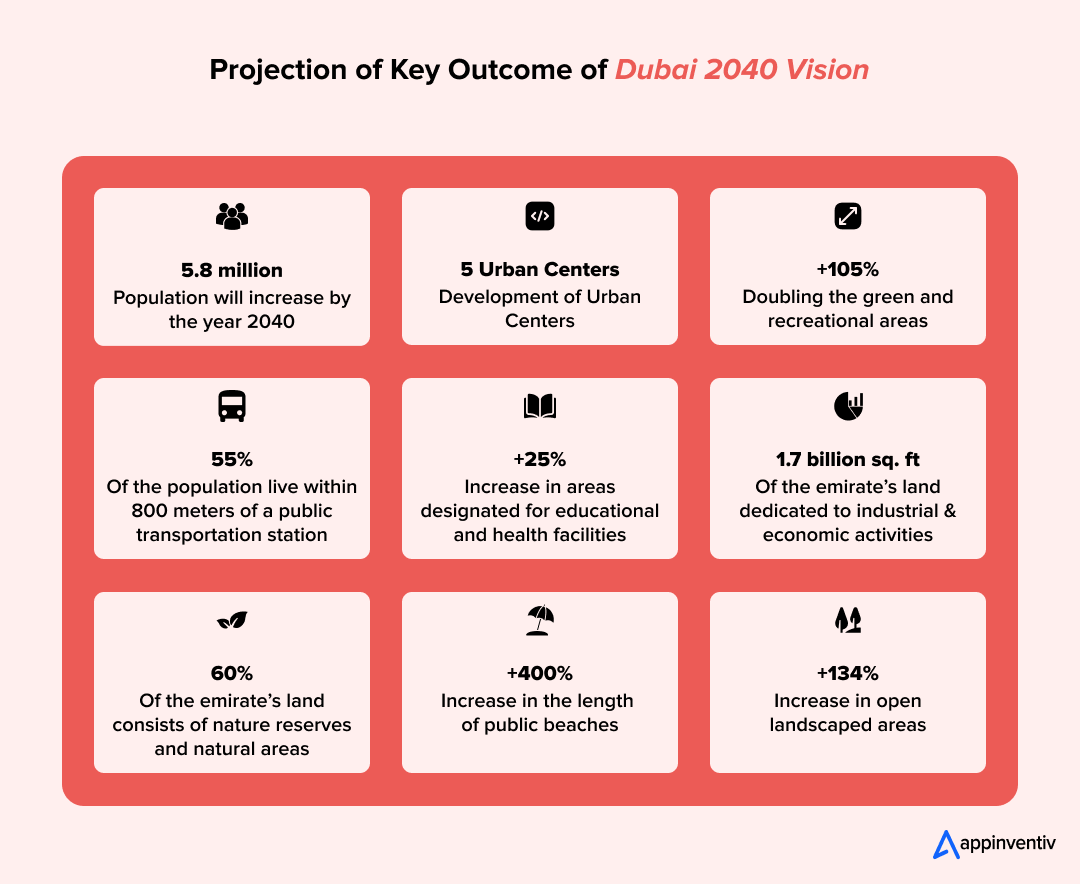
Key Strategic Areas
The Dubai 2040 vision is anchored by several key strategic areas, each demanding innovative technological solutions to achieve its ambitious targets.
Sustainable Urban Development
With an emphasis on green technology in app development, Dubai aims to reduce carbon emissions greatly by 2030 and achieve zero waste to landfill by 2035. The Dubai Roads and Transport Authority (RTA) specifically aims to eliminate municipal waste going to landfills by 2030 through extensive reuse and recycling initiatives. Custom software solutions play a pivotal role in monitoring environmental metrics and enabling resource-efficient operations.
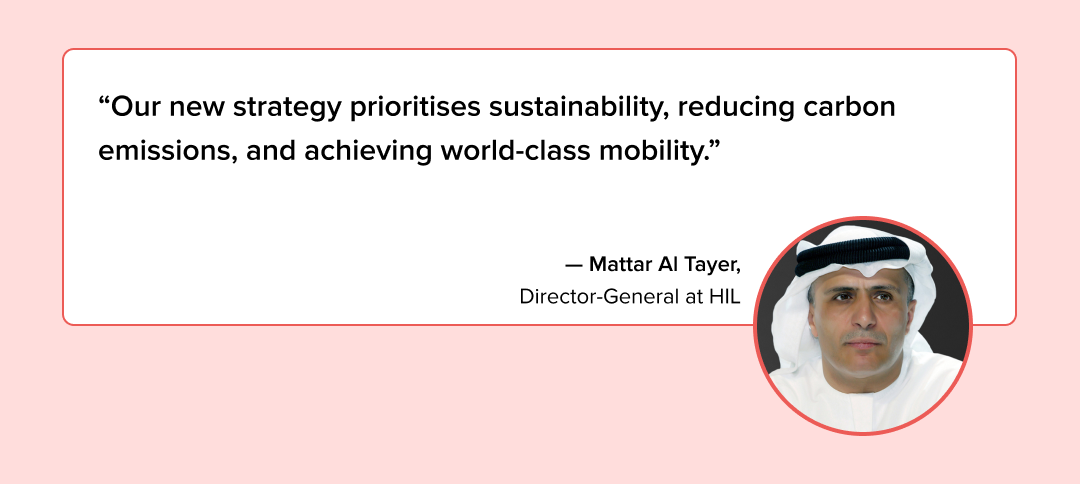
Enhanced Quality of Life
Hand-in-hand with sustainability is the goal of Enhanced Quality of Life, which seeks to create vibrant, inclusive, and healthy communities. Enterprise mobility in Dubai ensures seamless access to essential services like healthcare and education, fostering a sense of inclusive and vibrant communities, and providing ample recreational opportunities.
Economic Growth and Diversification
Dubai’s economic strategy focuses on fostering innovation, attracting global talent, and expanding key industries including technology, finance, healthcare, and education. The Dubai innovation strategy 2040 emphasizes creating free zones and technology hubs that offer world-class infrastructure and amenities, providing competitive advantages on a global scale.
World-Class Infrastructure & Connectivity
The expansion of transportation networks, digital connectivity, and logistics infrastructure is supported by smart city app development in Dubai. This enables seamless mobility and integrated services.
Preservation of Cultural and Urban Heritage
Balancing modernity with cultural preservation requires custom software for urban planning that documents, protects, and promotes Dubai’s heritage while integrating it with contemporary urban development. Tech solutions for sustainable cities include augmented reality applications for cultural sites, digital archives for historical preservation, and smart tourism platforms that guide visitors through heritage areas while managing crowd flow and environmental impact.
How Custom Enterprise Apps Are Driving Dubai’s Vision 2040
The heart of Dubai’s transformation into a smart, sustainable city lies in the intelligent application of technology, specifically through custom enterprise app development in Dubai. These tailor-made solutions are not just digital tools; they are the gears that mesh disparate urban systems, optimize resources, and elevate the citizen experience, directly contributing to the ambitious goals of the Dubai 2040 Vision smart city.
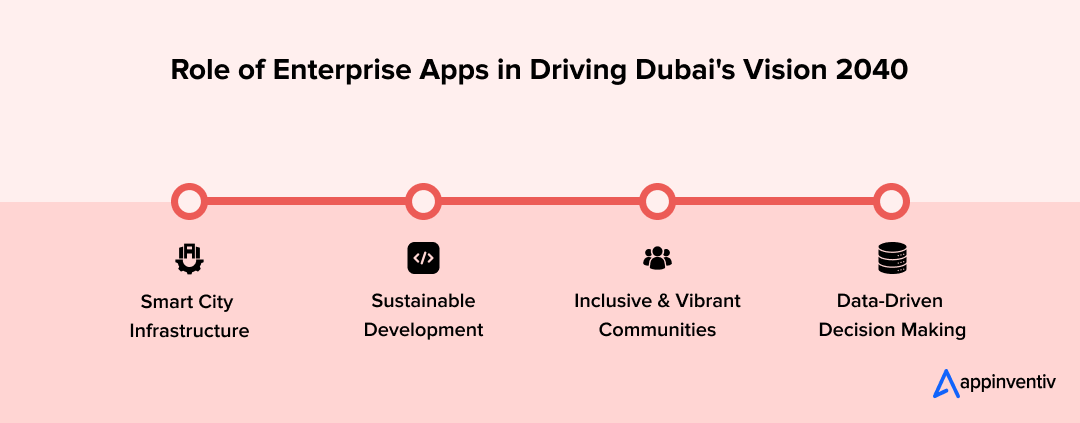
Smart City Infrastructure
At the core of a smart city is its infrastructure, and custom enterprise apps are transforming how Dubai manages its urban backbone. These applications leverage vast networks of IoT sensors for real-time data collection & analysis.
Imagine traffic management systems that not only monitor vehicle flow but also predict congestion hot spots, allowing for dynamic signal adjustments and alternative route suggestions via mobile apps. Similarly, utility monitoring applications can detect anomalies in water and electricity consumption, preventing waste and predicting maintenance needs.
This integrated approach allows for seamless operations across various urban services, fostering an environment where predictive maintenance is the norm and resources are allocated with unparalleled efficiency.
Sustainable Development
Enterprise applications facilitate environmental monitoring that tracks water and energy use, emissions, and waste. These systems leverage tech solutions for sustainable cities by integrating green building certifications, promoting renewable energy projects, and enabling circular economy initiatives.
For instance, the Dubai Electricity and Water Authority (DEWA) saw over 14 million digital transactions in 2024 through its smart app and other digital channels, achieving 99.2% digital adoption of its services and highlighting the efficiency gains from integrated smart services.
Inclusive and Vibrant Communities
A smart city isn’t just about technology; it’s about people. Custom enterprise apps are fostering more inclusive and vibrant communities in Dubai. Citizen engagement platforms provide direct channels for public feedback, participation in community initiatives, and seamless communication with government services. Apps that streamline access to healthcare, education, and social services are enhancing the quality of life for all residents, ensuring equitable access to essential amenities.
For example, DubaiNow, a government app, provides access to more than 250 government and private sector services from over 35 entities, demonstrating the city’s commitment to citizen convenience and digital accessibility.
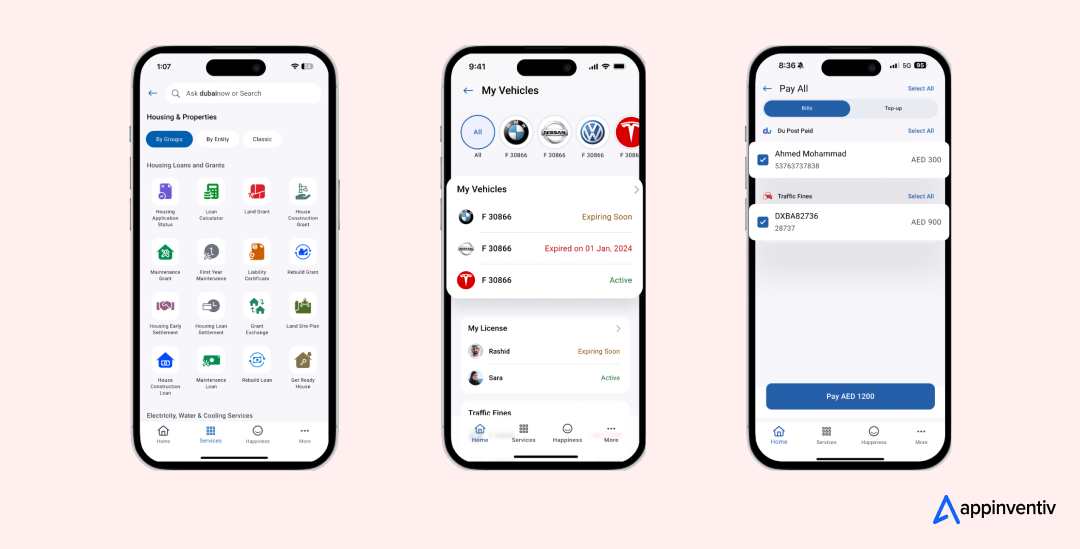
Data-Driven Decision Making
The true power of custom enterprise apps in Dubai’s vision lies in their ability to facilitate data-driven decision making. These applications process colossal datasets collected from various urban systems, enabling predictive analytics for urban planning. This allows city planners to forecast urban growth patterns, anticipate resource needs, and proactively address potential challenges before they escalate.
Performance monitoring and reporting through these apps provide invaluable insights into the effectiveness of smart city initiatives, allowing for continuous refinement and ensuring Dubai stays on track towards its 2040 goals.
Furthermore, custom government app solutions in Dubai are enhancing governance and transparency by streamlining bureaucratic processes, minimizing red tape, and fostering greater accountability across public services.
Examples of Custom Enterprise Apps in Dubai
Dubai’s commitment to its 2040 Vision is vividly brought to life through a multitude of sophisticated examples of custom enterprise apps that address various facets of urban life. These applications are not just about convenience; they are about orchestrating a symphony of urban services to create a truly smart and sustainable environment.
Dubai Smart City Platform
The Dubai Smart City Platform stands as a monolithic example of integrated urban management. This platform functions as a central digital hub, consolidating numerous smart services under one umbrella. Its functionality ranges from providing residents with seamless access to government services and information to facilitating real-time data exchange across various city departments.
The impact is profound: it significantly contributes to seamless living and business operations by reducing bureaucratic hurdles, enhancing transparency, and empowering citizens with immediate access to crucial services.
Waste Management Apps
Driving Dubai’s sustainability agenda are innovative waste management apps. These applications are designed to facilitate efficient waste collection, promote segregation at the source, and boost recycling initiatives.
Features often include GPS-enabled tracking of waste collection vehicles, real-time bin level monitoring to optimize collection routes, and educational modules for residents on proper waste disposal and recycling practices. The benefits are clear: reduced operational costs for waste management companies, minimized environmental impact through higher recycling rates, and a cleaner, greener city.
Public Transportation Apps
For a bustling metropolis like Dubai, efficient and sustainable public transportation is paramount. Custom public transportation apps are at the forefront of this effort. The S’hail app, developed by RTA, is an excellent example. Its capabilities include real-time tracking of buses, metros, and trams, comprehensive route planning with estimated travel times, digital payment integration for fares (like Nol card management), and smart ticketing options.
This seamless integration of various transportation modes significantly contributes to Dubai’s Vision 2040 by promoting sustainable mobility, reducing traffic congestion, and enhancing citizen convenience. The IMD Smart City Index 2025 highlights Dubai’s RTA excelling in smart mobility pillars, with a 67.9% utilization rate for vehicle-sharing applications and 73.8% for smart parking search applications.
Other Noteworthy Examples
Beyond these major categories, numerous other custom enterprise apps in Dubai contribute to the city’s smart and sustainable goals:
DubaiNow (Government Services)
This comprehensive app provides residents and tourists access to over 250 government and private sector services from over 35 entities. It embodies the concept of “government in your pocket,” promoting citizen convenience and business automation in the UAE.
DEWA Smart App (Electricity & Water Services)
Operated by the Dubai Electricity and Water Authority, this app allows customers to manage their utility accounts, pay bills, monitor consumption, and receive outage alerts. Its widespread digital adoption (99.2% in 2024, with over 4.8 million transactions via the app) underscores its critical role in smart utility management and resource efficiency.
Dubai Police Smart Apps (Safety & Security)
Dubai Police leverages a suite of smart apps for various functions, including reporting incidents, accessing police services, and emergency assistance. Their 2025-2030 strategy for the Centre for the Future of Digital Mobility highlights plans to build an intelligent and integrated infrastructure for secure mobility, utilizing AI, predictive analytics, and agile systems to enhance emergency response and overall public safety.
Benefits of Custom Enterprise Apps for Dubai’s Vision 2040
The adoption of enterprise software development in the UAE offers a multi-faceted array of benefits crucial for realizing Dubai’s audacious 2040 Vision. These advantages extend far beyond mere operational improvements, touching upon strategic growth, security, and global standing.
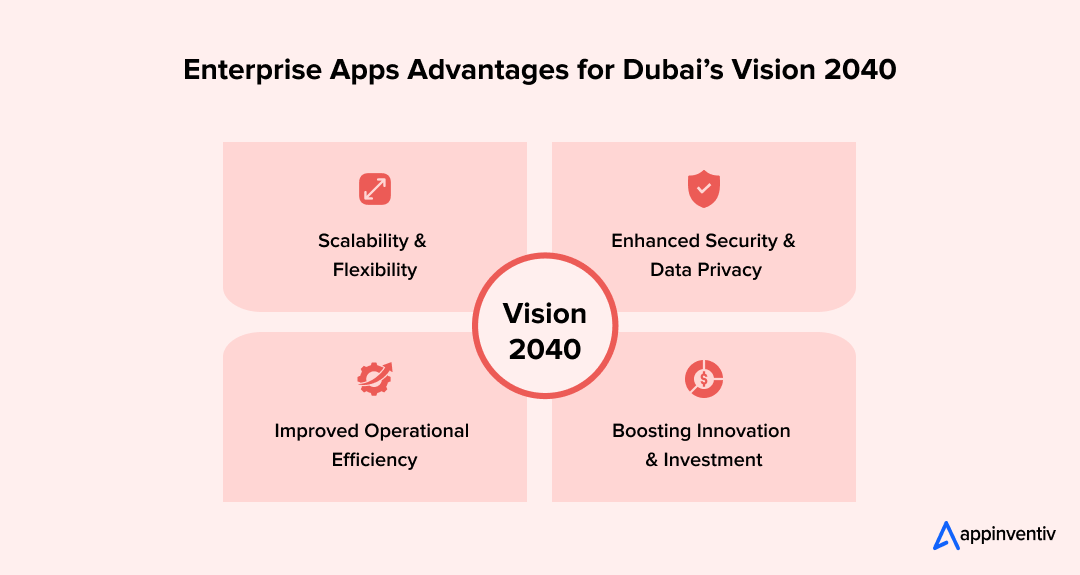
Scalability and Flexibility
One of the primary benefits is scalability and flexibility tailored to Dubai’s unique urban landscape. Unlike off-the-shelf solutions, custom enterprise apps are designed from the ground up to address the specific needs and growth trajectory of Dubai. As the city expands and its needs evolve, these apps can be seamlessly scaled up or modified without disrupting existing infrastructure. This adaptability is vital for a dynamic urban environment like Dubai, ensuring that technological solutions remain relevant and effective over decades.
Enhanced Security and Data Privacy
Furthermore, enhanced security and data privacy aligned with regulatory frameworks are paramount. In an era where data breaches are a constant threat, custom applications allow for the implementation of robust security protocols and encryption measures tailored to specific data sensitivity levels and local regulations.
This fosters trust among citizens and businesses, encouraging greater adoption of digital services, which is a cornerstone of the Dubai 2040 Vision smart city. Gartner forecasts spending on information security in MENA to total $3.3 billion in 2025, an increase of 14% from 2024, driven by digital transformation and AI integration. This underscores the regional focus on secure, innovative enterprise applications.
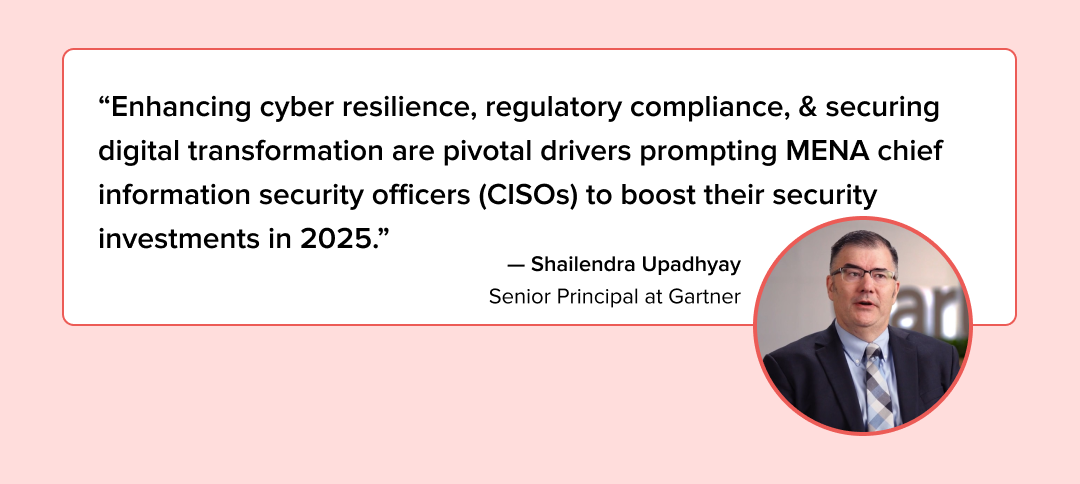
Improved Operational Efficiency
These bespoke solutions also lead to improved operational efficiency across the government and private sectors. By automating complex workflows, integrating disparate systems, and providing real-time data insights, custom apps eliminate manual errors, reduce processing times, and free up human resources for more strategic tasks. This not only cuts costs but also enhances the speed and quality of public services and business operations.
Boosting Innovation and Investment
Finally, embracing custom enterprise app development in Dubai directly contributes to boosting innovation and attracting global investment. When a city demonstrates a commitment to cutting-edge, tailor-made technological solutions, it signals to the world that it is a hub for innovation. This attracts tech talent, fosters a vibrant startup ecosystem, and encourages international companies to establish their presence, further solidifying Dubai’s reputation as a leader in urban innovation through technology in the UAE.
Interested in enterprise app development but unsure how to do it right? Where to start? What will be the cost of custom enterprise app development in Dubai? Well, we have got you covered. Check out our comprehensive guide on Enterprise Mobile App Development—your ultimate resource to navigate the process, understand key considerations, and make informed decisions for building scalable, impactful enterprise platforms.
Challenges and Solutions in Implementing Smart City Apps
While the promise of smart city apps is immense, their implementation in a complex urban environment like Dubai is not without its challenges. Addressing these hurdles proactively is crucial for sustained success.
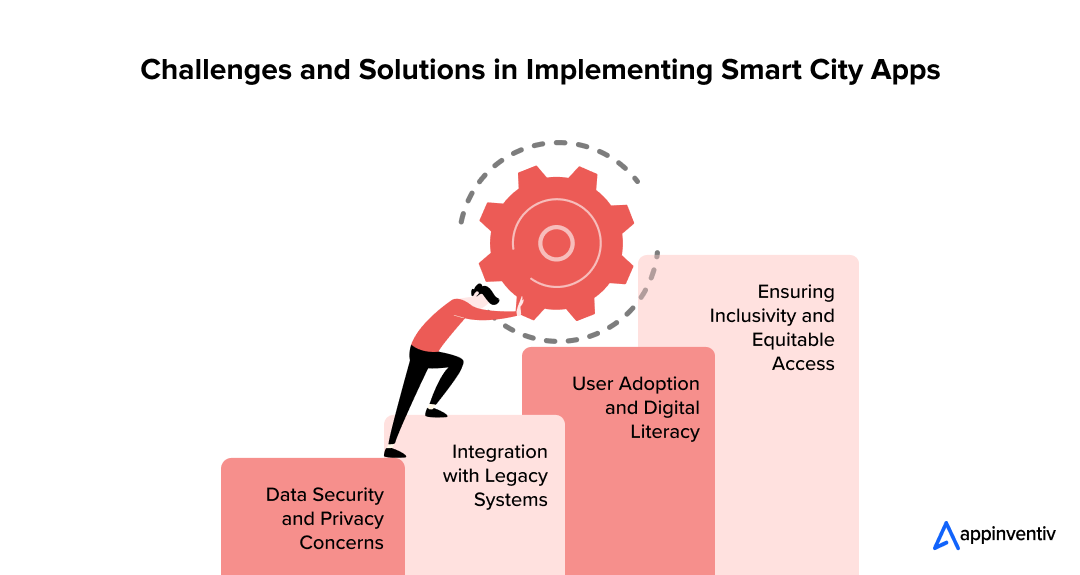
1. Data Security and Privacy Concerns
Challenge:
Smart city apps collect vast amounts of sensitive personal and infrastructural data, making them prime targets for cyberattacks and unauthorized access. Protecting citizens’ privacy while complying with regulations like GDPR and the UAE’s data protection laws is a significant hurdle.
Solution:
Adopting advanced security techniques such as end-to-end encryption, multi-factor authentication, and zero-trust architectures can safeguard data integrity.
2. Integration with Legacy Systems
Challenge:
Dubai’s urban infrastructure includes many legacy systems that were not designed to interoperate with modern digital platforms. Integrating IoT-driven smart city apps with these existing systems without causing disruption is technically complex and costly.
Solution:
Employing modular and API-driven architectures allows new apps to communicate seamlessly with legacy systems. Middleware platforms can act as translators between old and new technologies, enabling gradual modernization without full system overhauls. Enterprises seeking comprehensive transformation should explore legacy system modernization strategies that go beyond temporary bridging solutions to deliver long-term ROI, reduced technical debt, and alignment with Dubai’s 2040 digital infrastructure vision.
Also Read: A Comprehensive Guide on Mobile App Architecture
3. User Adoption and Digital Literacy
Challenge:
For smart city apps to succeed, residents and government employees alike must adopt and effectively use these technologies. However, varying levels of digital literacy, resistance to change, and accessibility issues can hamper adoption.
Solution:
Developing intuitive, user-friendly interfaces with multilingual support ensures accessibility across diverse demographics. Additionally, conducting awareness campaigns and digital literacy programs encourages engagement, fostering widespread acceptance.
4. Ensuring Inclusivity and Equitable Access
Challenge:
Digital divides based on socio-economic status, geography, or disability risk exclude vulnerable populations from benefiting equally from smart city innovations.
Solution:
Designing apps with inclusivity as a core principle, such as mobile-first designs, offline capabilities, and accessibility features (screen readers, voice commands) ensures broad usability and can bridge access gaps.
Each challenge is a critical puzzle piece in the broader smart city ecosystem. Addressing them proactively with tailored solutions guarantees that enterprise software development in the UAE not only drives innovation but also builds trust and inclusion in Dubai’s smart future.
You may like reading: Mobile App Development Cost in Saudi Arabia
The Technology Stack Behind Dubai’s Vision 2040
Dubai is actively leveraging advanced technologies to architect a digital ecosystem built on robust, cutting-edge foundations. The technological prowess driving Dubai’s smart city initiatives is multifaceted, embracing a combination of established and emerging technologies to create a seamless, interconnected, and intelligent urban fabric. This blend of innovation allows Dubai to continually push the boundaries of what a modern city can achieve. Here is how Dubai is using technology to achieve the 2040 Vision.
Cloud Infrastructure
Multi-cloud strategies and hybrid deployments form the backbone of Dubai’s smart city applications. This approach provides the flexibility, scalability, and resilience necessary to handle vast amounts of data and support a multitude of services. By leveraging both public and private cloud solutions, Dubai ensures data security while maintaining the agility to expand its digital services as needed.
IoT Integration
Sensor networks and device management platforms are crucial for collecting real-time data that powers smart city operations. From traffic sensors and smart lighting to environmental monitors and waste bin sensors, the Internet of Things (IoT) provides the eyes and ears of the city. IoT-powered enterprise apps allow for precise monitoring and control, enabling dynamic responses to changing urban conditions.
AI & Machine Learning
AI & Machine Learning play a pivotal role in Dubai’s smart city development by turning vast amounts of raw data into actionable intelligence through predictive analytics and automation. AI in smart city development enables Dubai to accurately forecast traffic patterns, anticipate infrastructure maintenance, optimize energy usage, and bolster public safety with intelligent surveillance systems.
Machine learning algorithms continuously learn from data, allowing Dubai’s smart infrastructure to improve efficiency and decision-making autonomously, minimizing the need for constant human intervention.
Blockchain
Secure transactions and digital identity management are increasingly being integrated to enhance transparency, security, and efficiency across various government and private sector services. For example, Dubai’s Department of Finance partnered with Crypto.com in May 2025 to enable cryptocurrency payments for government services, aligning with the Dubai Cashless Strategy and setting a global benchmark for crypto integration in public services.
Also Read: How to Implement Blockchain into your Business
Bring your vision to life with Appinevntiv
The Future Landscape: Innovation Beyond 2040
Dubai’s vision doesn’t merely stop at 2040; it extends far into the future, propelled by an unwavering commitment to innovation and technological advancement. The city is constantly exploring and integrating emerging technologies to maintain its competitive edge and ensure sustained urban development.
- The adoption of AI in business will continue to expand, powering even more sophisticated predictive models for urban planning, resource management, and personalized citizen services.
- Machine Learning will evolve to create hyper-efficient algorithms for everything from smart grid optimization to anticipating public health trends.
- Blockchain, beyond secure transactions, may see broader use cases of custom enterprise apps powering Dubai’s vision for transparent supply chains, secure digital identities, and decentralized autonomous organizations (DAOs) for community governance.
- The proliferation of IoT in different industries will create an even denser network of real-time data, enabling more granular control and automated responses across the urban landscape.
This continuous drive for innovation underscores the continued customization of enterprise apps. As new technologies emerge and urban challenges evolve, generic solutions will fall short. Dubai’s strategic foresight recognizes the ongoing need for bespoke software that can adapt to specific requirements and leverage the latest technological breakthroughs. This agile approach to enterprise application development for smart cities positions Dubai at the forefront of urban innovation.
Appinventiv’s Role in Shaping Dubai’s Smart Future
Appinventiv, a leading mobile app development company in Dubai, specializes in crafting innovative digital solutions that align with Dubai’s Vision 2040 for smart, sustainable growth. Our team of 1600+ tech experts excels in custom enterprise app development, empowering global brands to enhance user experiences, streamline operations, and drive business growth.
Let’s get a glimpse of some of our case studies in the Middle East to comprehend how our unmatched excellence in custom enterprise app development in Dubai can supercharge the city’s Vision 2040:
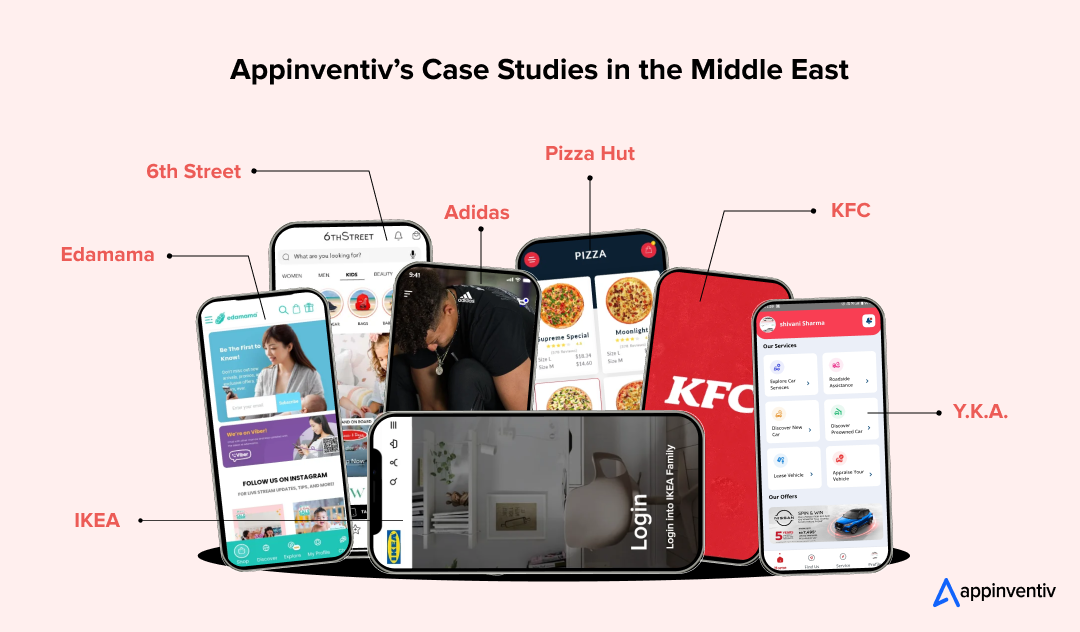
KFC – Revolutionizing Food Delivery Across the Middle East
- Challenge: KFC aimed to enhance its digital presence and reduce dependency on third-party aggregators.
- Solution: We partnered with KFC to develop a comprehensive mobile app offering multiple order modes, including delivery, self-pickup, drive-thru, dine-in, and carhop, integrated with QR functionality for in-restaurant orders.
- Outcome: The app achieved a 22% increase in conversions while maintaining an impressive 4.5-star average rating across both app stores. Over half of all orders now come directly through the app, accompanied by a 60% rise in repeat purchases, demonstrating its strong impact on user retention and satisfaction.
Pizza Hut – Enhancing User Experience Across MENA
- Challenge: Pizza Hut sought to revamp its mobile app to improve user engagement and streamline operations across multiple countries.
- Solution: We redesigned the Pizza Hut app’s UI/UX to ensure a seamless and engaging user experience, addressing operational challenges and optimizing performance.
- Outcome: The revamped app resulted in over 50,000 downloads, a 30% increase in conversion rates, and a 7-second improvement in screen transition times.
IKEA – Transforming Retail with an Innovative ERP Solution
- Challenge: IKEA needed an efficient ERP system to manage product availability and enhance customer engagement.
- Solution: We developed an ERP solution for IKEA that provided real-time product information and collected customer data for targeted marketing.
- Outcome: The solution became the primary marketing asset for IKEA stores, deployed across 7+ locations in the UAE, significantly improving operational efficiency and customer satisfaction.
Adidas – Expanding Digital Presence in the Middle East
- Challenge: Adidas aimed to enhance its mobile presence to reach a broader audience in the Middle East.
- Solution: We developed a dedicated eCommerce mobile app that preserved Adidas’ design system and provided a seamless shopping experience.
- Outcome: The app achieved over 2 million downloads and acquired more than 500,000 new users, expanding Adidas’ market reach in Saudi Arabia and Qatar.
6th Street – Elevating Fashion Retail Experience
- Challenge: 6th Street aimed to enhance its digital platform to provide a superior shopping experience for fashion enthusiasts.
- Solution: We developed an intuitive eCommerce app that offered a wide range of fashion products, personalized recommendations, and seamless checkout processes.
- Outcome: The app garnered over 3 million iOS downloads and 1 million Android downloads, significantly boosting 6thStreet’s online presence and sales.
Y.K.A. – Building a Robust Retail and Distribution Platform
- Challenge: Y.K. Almoayyed & Sons needed a scalable and secure platform to manage their retail and distribution operations.
- Solution: We partnered with YKA to implement a cloud-based infrastructure using AWS services, ensuring high availability, scalability, and robust security measures.
- Outcome: The platform enhanced operational efficiency, strengthened data security, and positioned Y.K. Almoayyed & Sons as a leader in technology-driven retail and distribution.
Edamama – Innovating eCommerce for Parents
- Challenge: Edamama sought to enhance its online shopping platform to better serve parents in the Philippines.
- Solution: We developed Edamama, a user-friendly eCommerce app, tailored to the needs of parents, integrating features that facilitated easy navigation and product discovery.
- Impact: The app improved user engagement and customer satisfaction, solidifying Edamama’s position as a leading online retailer for parents.
These success stories demonstrate our unwavering commitment to delivering tailored, innovative solutions that align with Dubai’s Vision 2040. So, why wait? If you are eager to play a pivotal role in Dubai’s extraordinary journey towards Vision 2040 and beyond, Appinventiv is here to help.
Partner with us to build the smart future together.
FAQs
Q. What role do custom enterprise apps play in building smart cities?
A. Custom enterprise app development in Dubai is the operational backbone of smart cities. They collect and analyze real-time data, automate services, integrate disparate urban systems, and provide intuitive interfaces for citizen engagement.
This allows for custom software for urban planning, efficient resource management, improved public safety, and enhanced overall quality of life, directly contributing to the realization of smart city visions like the Dubai 2040 Vision smart city.
Q. How can mobile apps help Dubai become a sustainable city?
A. Mobile apps are crucial for Dubai’s sustainability goals by enabling intelligent energy management through smart grids, optimizing waste collection and recycling, facilitating green building management, and promoting eco-friendly transportation choices. They empower citizens and businesses to monitor their environmental footprint and actively participate in sustainable cities’ efforts.
Q. What technologies are behind Dubai’s smart city infrastructure?
A. Dubai’s smart city infrastructure is powered by a sophisticated blend of technologies, primarily including robust Cloud Infrastructure for scalability, extensive IoT in urban management through sensor networks for data collection, advanced AI in smart city development, and Blockchain for secure transactions and digital identity management. These technologies collectively enable real-time decision-making and interconnected urban services.
Q. Why are custom software solutions important for urban innovation?
A. Custom software solutions are vital for urban innovation because they provide tailored functionalities that precisely meet the unique and evolving needs of a city, unlike generic off-the-shelf products. They offer unparalleled scalability, robust security specific to urban data, seamless integration with existing complex systems, and foster a dynamic environment for urban innovation through technology in the UAE by attracting talent and investment.
Q. What ROI should we expect and how do we de-risk?
A. ROI typically comes from digitized workflows (cycle-time cuts), higher citizen/customer satisfaction, and compliance automation; prove it via a contained pilot with before/after KPIs, then scale. Appinventiv’s track record delivering high-adoption consumer apps for brands like KFC and Adidas shows our ability to execute at scale and convert usage into business value.
Q. Which technologies move the needle fastest for city-wide impact?
A. Start with an integration backbone (microservices + open APIs), real-time telemetry (IoT) where assets/operations are involved, and AI/ML for demand forecasting, routing, and service personalization. Pair with geospatial services, UAE PASS for trusted digital identity, and open-data participation to compound value across entities. Align with Digital Dubai’s strategy to ensure interoperability and accelerate approvals.
Q. What must we get right on compliance and cybersecurity in the UAE?
A. Design privacy-by-default: data minimization, encryption in transit/at rest, RBAC, audit trails, and vendor due-diligence. Comply with the UAE Personal Data Protection Law and Dubai’s Open Data framework; document data flows and retention, and plan for continuous security testing and monitoring.
Q. How much does custom enterprise app development cost?
A. Building a bespoke enterprise‑grade application, the cost will vary significantly. On average, the cost to build an enterprise application ranges between $40,000 and $400,000 or more, depending on several critical components.
Additionally, ongoing maintenance/support adds 15‑20% of the initial build cost per year.
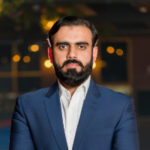

- In just 2 mins you will get a response
- Your idea is 100% protected by our Non Disclosure Agreement.
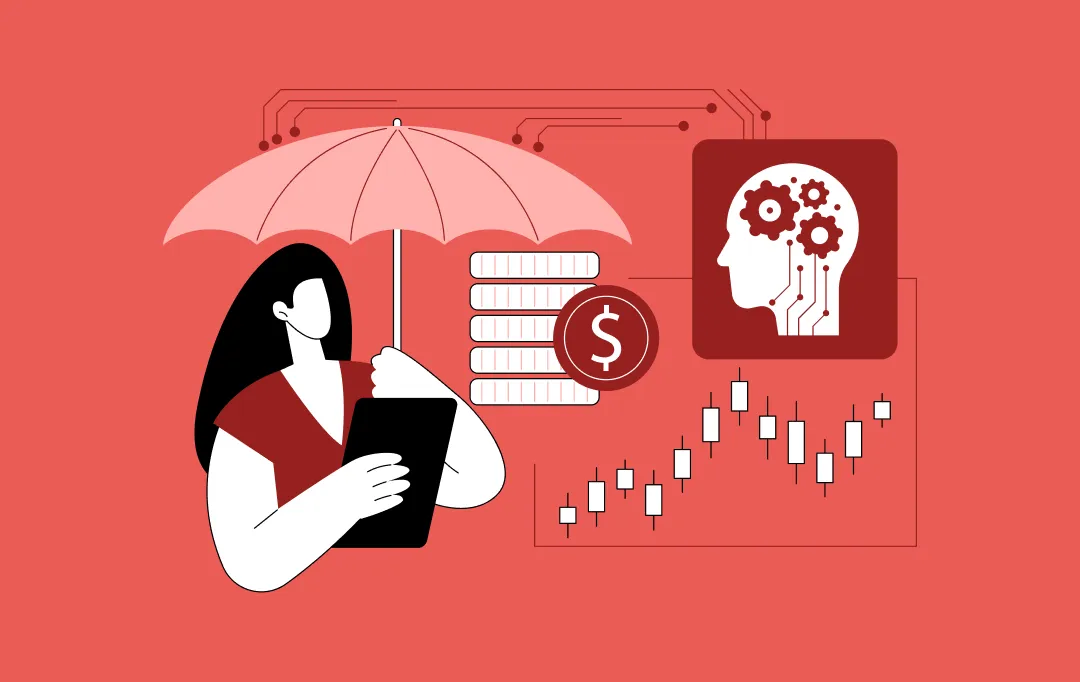
Enterprise Risk Management Strategies for Complex Business Environments
Key Takeaways Enterprise risk management is shifting from periodic reporting toward continuous operational risk visibility. Integrated risk data improves decision speed, readiness for compliance, and overall business resilience. Governance alignment and data integration strengthen the effectiveness of enterprise risk management in complex environments. Industry-specific ERM approaches help address regulatory, operational, and technology-driven risk exposure. Structured…

Turning Legacy Data into Business Intelligence: A Food Chain’s Success Story
When you walk into a food outlet and place an order, it looks simple: swipe your card, grab your meal, and go. But behind every order lies a stream of valuable data. Now, imagine this happening across hundreds of stores spread across multiple countries, with each outlet running several POS (Point of Sale) systems. That’s…
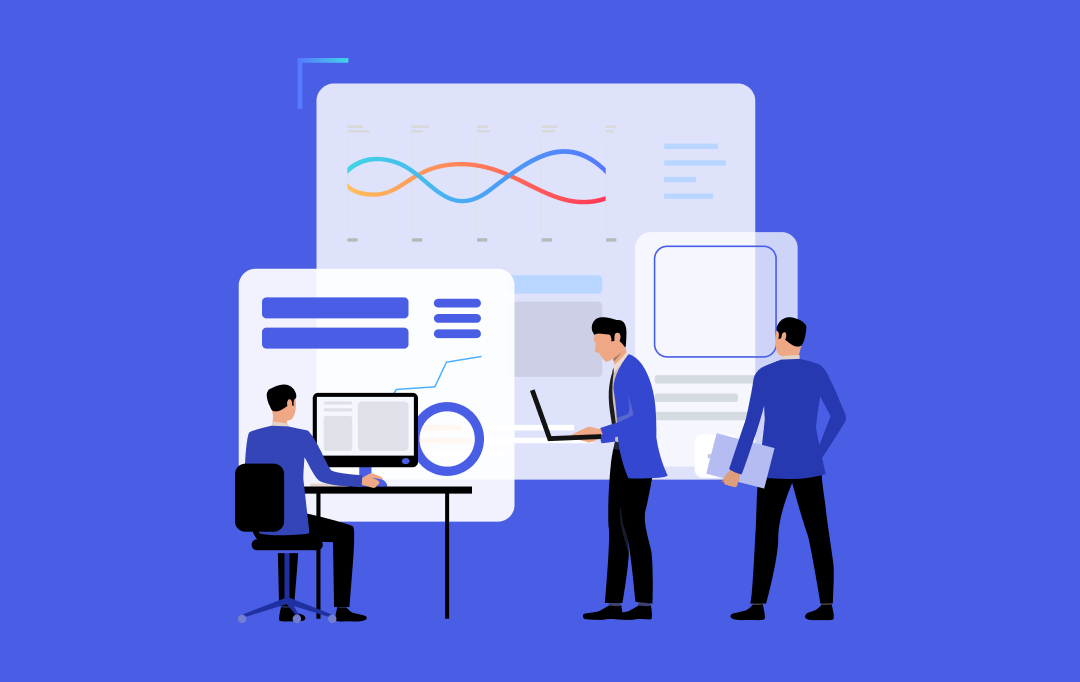
Building a Robust Enterprise Data Strategy - Benefits, Use Cases, Process, Costs & Best Practices
Key takeaways: A solid enterprise data strategy removes silos, reduces costs, and restores confidence in decisions. AI initiatives only succeed when built on reliable, well-governed enterprise data foundations. Executives, employees, and customers gain through faster insights and personalized experiences. The roadmap starts with goal alignment, audits, future vision, and phased execution. Industries see measurable ROI:…




















